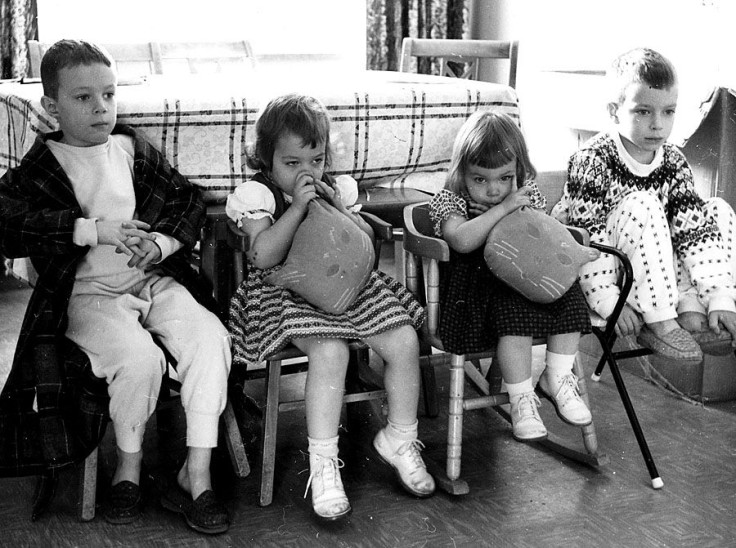Television Slows Cognitive Devolopment In Preschoolers; Even ‘Educational’ Programs Deemed Too Superficial

Once upon a time, the trumpeting intro to CBS’s Sunday Morning with Charles Kuralt sent children scurrying from the room, to play elsewhere. “Cartoon Day” was yesterday, and televisions offered nothing but background, an aural carpeting of jingles and happy talk. Outside were games of imagination and challenges of derring-do.
Since then, television has grown larger in America, in both size and scope—i.e., larger sets with far more channels. To the detriment of children's health, every day is cartoon day.
Aside from contributing to childhood obesity and other concerns, television may hamper a child’s theory of mind development, the ability to attribute mental states to the self and to others. Investigators at Ohio State University interviewed and tested more than 100 preschool children and their parents for a study appearing Thursday in the Journal of Communication. They found a strong link between poor development of theory of mind and exposure to television running in the background and in a child’s bedroom.
Lead investigator Amy Nathanson says this disrupted ability to perceive the mind of others may cause impaired social behavior seen in previous study of television’s influence on children.
"When children achieve a theory of mind, they have reached a very important milestone in their social and cognitive development," Nathanson said in a statement. "Children with more developed theories of mind are better able to participate in social relationships. These children can engage in more sensitive, cooperative interactions with other children and are less likely to resort to aggression as a means of achieving goals."
Nathanson and her colleagues gave children tasks to assess capacity for understanding mental states occurring outside of their own minds, thoughts and beliefs likely experienced by others, which influence behaviors. Even after controlling for age and socioeconomic status, investigators found a link between increased exposure to background television and weaker understanding of mental states. Yet, they also found that theory of mind development improved when parents talked with them about television, rather than merely leaving them to their (electronic) devices.
As past work shows that siblings help improve one’s development of theory of mind, Nathanson speculated about several reasons television might hamper growth of this mental capacity. “Television may displace opportunities for richer social interaction that would otherwise promote [theory of mind]," the investigators wrote. “Prior work has found that [such] development is facilitated by hearing mental-state language in the home, engaging in pretend play, and interacting with siblings; however, when background television is present, parents engage with their children less, thereby reducing the opportunity for conversation.”
Interestingly, families cited disagreement over viewing choices as a reason for placing monitors in children’s rooms, a proliferation of channels sundering the nuclear family.
“In these ways, both heavy background television and the presence of a television in the child’s bedroom may be indicators of households in which parents are relatively less engaged with children,” the investigators wrote. “The decreased interaction may ultimately be responsible for their lower [theory of mind] scores.”
However, the study did not determine whether decreased verbal interaction between parent and child, brought by television, contributed to the hampered mental capacity or whether something else about television harmed the brain. Nathanson and her colleagues also wondered whether lower measurements of the development were influenced by children’s television fare portraying flat characters engaged in superficial interactions.

In many U.S. households, television programs carried by Netflix-enabled iPads allow the child not only bedroom retreat but the opportunity to wander about the house and property in a bubble of superficiality brought by Disney and Nickelodeon, among others. “Most programs for children focus on visually stimulating material, thereby providing children with less opportunity to ponder mental states or to recognize their importance,” the investigators wrote. “Even when programs do showcase characters’ mental states, it may be unlikely that children will recognize them.”
To this idea many parents cite the educational nature of television, including Disney and Nickelodeon networks, whose interplay of unusually attractive and well-spoken children provide a junior version of the afternoon soap opera. Those teleplays help teach children about the social sphere of the human species, they argue, in addition to introducing new vocabulary. However, Nathanson and her colleagues argue that while television may help to expand vocabulary the development of theory of mind depends on more than mere exposure to “mental-state language spoken by two-dimensional television characters.” Although conversation contains language, the more complex development of theory of mind depends upon the exchange and negotiation of thoughts and ideas.
Just one caveat, the investigators added. Exposure to longer-form entertainment such as movies helped a bit with development of theory of mind, given perhaps a greater complexity of character develop amid multiple mind-states in play.
Source: Nathanson, Amy I., Sharp, Molly L., Alade, Fashina, Rasmussen, Eric E., The Relation Between Television Exposure And Theory of Mind Among Preschoolers. Journal of Communication. 2013.
Published by Medicaldaily.com



























